 Before an exam, do you still go to tutorial classes? Without going to classes, is it still necessary to borrow the notes of classmates? Do you still have to go to the library to search for information? Information technology has brought new modes for those learning needs. Through mobile terminals, the above mentioned requirements will be integrated into routine learning activities.
Before an exam, do you still go to tutorial classes? Without going to classes, is it still necessary to borrow the notes of classmates? Do you still have to go to the library to search for information? Information technology has brought new modes for those learning needs. Through mobile terminals, the above mentioned requirements will be integrated into routine learning activities.
On 9 September 9th 2014, the venue for the activities of the OUC’s third information technology application exhibition witnessed an animated atmospheatmosphere.Focusing on the “cloud”, more than 40 projects from 17 departments showed the latest developments achieved by the teaching and administrative staff of the OUC in exploring “the deep integration of information technology and education”.
Four teachers from the School of Economics and Management used the mobile learning terminals customized by the OUC to demonstrate the “Five-minute lectures”, “Testing-assessing-training teaching model and online course realization”, “Mobile-learning all-media digital teaching materials for Western Economics”, “Online core course on Investment”, which showed the characteristics of self-directed learning and fragmented learning and helped visitors experience the advantages of micro-lectures such as refined contents, diversified terminal carriers and flexible and convenient applications.
The Department of Teaching Resources Management showed the “Internet TV box” and “OUC’s reading express and mobile library-reading, Kaijuan” which unveiled the advantages of the “cloud”. The mobile interactive digital teaching materials being demonstrated in the show refreshed people’s traditional understanding about teaching materials and attracted many visitors to stop over to have a look. The teaching materials not only support such common functions as taking notes, encyclopedia, dictionary and community, but in addition, they can help students select related micro-lectures, learning resources and test centres based on the learning content, and browse teacher’s lecture notes and notes taken by class mates. While teachers can check the learning situation of students on the Internet, adjust their teaching according to progress, and also feedback relevant information to schools and even publishing houses. All these technologies can not only make students effectively use fragmented time to study, but also assign tutorial classes, borrowing notes, looking up information and reader questionnaires to history.
The School of Engineering demonstrated such contents as a “three-dimensional engine which can be disassembled showing the internal structure of complicated electromechanical components — edrawings teaching application” and “light-well point dewatering” micro lecture. All the content was also included as the important teaching innovation serving the “assistance plan for the training and development of the new kind of industrial worker” of the OUC.
The Department of Information Technology showed “the application of multi-terminal screen recording (Moodle learning platform)”. The on-site mobile virtual studio attracted audiences to actively try it. Its function that supports multi-portal input of information is very convenient for teachers to call for all kinds of data, which gave visitors a very deep impression.
The School of Agroforestry and Medicine paid close attention to the needs of modern social development and showed the latest courses such as the “online core courses on community nursing”, “online courses on social medicine”, “online courses on population sociology”, “online core courses on Health Economics”, “the state-level excellent resources sharing course --— human physiology”, “online course on common disease prevention in animals for One College Student per Village Programme (sample chapter)”, online course on health statistics”, “hugs for love”, “online course on phytophysiology (sample chapter)”, and so on.
Around the subject of “digital learning environment”, the CCRTVU Online showed such new applications as “mobile learning, online courses, MOOC, all-media digital teaching materials and micro lectures”.
The MOE Research & Training Centre for Community Education adopted a form of saloon on the spot to show “i-tea lab of community education” in a relaxed atmosphere. Visitors experienced a new-type community education learning pattern with online learning, interactivity and demonstration while drinking tea.
The Department of News and Public Information set the operation of “OUC micro news” as an example to demonstrate the WeChat’s application in news publication in the OUC.
The departments joining in this application exhibition include The School of Agroforestry and Medicine, The School of Engineering, The Academic Affairs Department, The School of Education, The Department of Teaching Resources Management (Library), The School of Humanities and Law, The School of Foreign Languages, The School of Economics and Management, The Information Technology Department, The Department of News and Public Information, The CCRTVU Online, The School of Arts, The Finance Department, The Learner Support Centre (Student Affairs Department), The Digital Learning Resources Centre, The MOE Research & Training Centre for Community Education, and so on.
The first information technology application exhibition of the OUC was held on 12 July 2012, and demonstrated 53 items. The activities were broadcasted live on Weibo. The second exhibition was held on 3 July 2013, in which more than 50 items attracted wide attention from the entire teaching and administrative staff. During the exhibition the debate competition was held on Weibo on the subject of “whether MOOCs will replace traditional education or not”.
The OUC information technology application exhibition used the “Learn about, explore and share fair” of The Open University in the UK (OUUK) for reference. The activity of the OUUK started in 2008 and has thus far continued for five sessions.

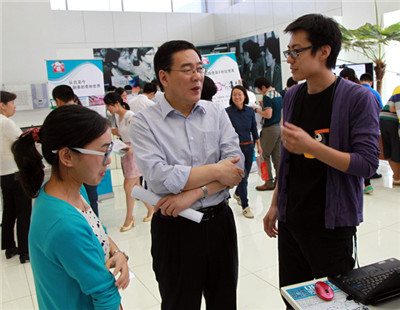
The Academic Affairs Department displays the application of the academic affairs management forum
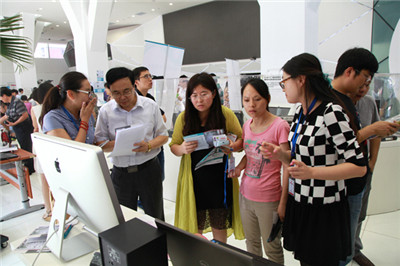
The Information Technology Department shows the application of multi-terminal screen recording
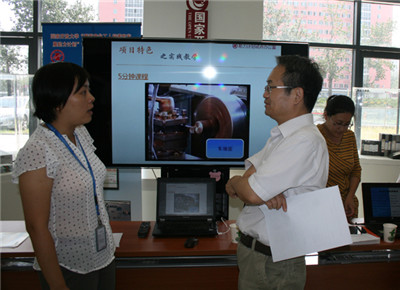
The School of Engineering shows a three-dimensional engine which can be disassembled with an internal structure of complicated electromechanical components — edrawings teaching application
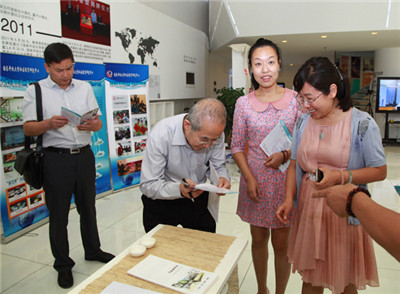
The stand of the MOE Research & Training Centre for Community Education
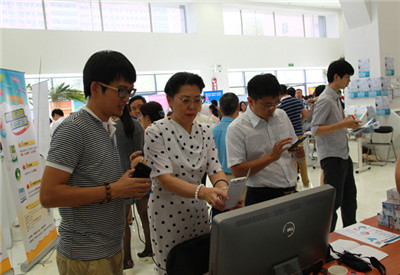
The Department of News and Public Information shows the application of WeChat in news publication
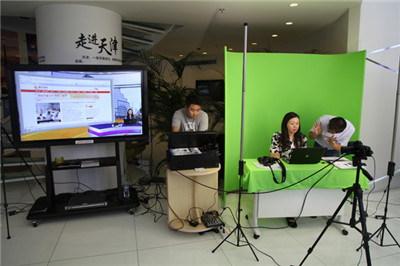
Visitors experience a portable complete HD 3D virtual live recording studio system
By Ni Zhongxun, the OUC